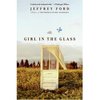You may assume I’m predisposed to like a book like The Girl in the Glass. It features some of my very favorite things–both as pieces of reality and fictional constructs–including but not limited to the Spiritualist movement, Coney Island freaks, magicians, butterflies, stylish con men, a witty girl, at least a few monsters, a murder mystery with powerful men at its heart, and language alternating between soft and rough poetry. Actually, though, I’m the opposite. A shoddy treatment of any one of these things is enough to engender immediate hatred and at least some ranting. All these things bring so much weight with them; they’ve been done well and they’ve been done terribly. To tackle them all, and to try to do so in a way that honors the historical moment the book is set in (1932), and be funny and dark at the same time–that’s damn hard.
Let it be known: Jeffrey Ford has done more than accomplish the damn hard, he’s made it seem effortless.
This book is as sweet a read as any magnificent con in action, and isn’t all real storytelling a con of some kind anyway? The story is anchored by the relationships between three scammers working together to bilk the wealthy bereaved: aging con man, Thomas Schell; a Mexican teenager adopted from the streets and playing the part of Ondoo the Mystic, Diego; and good-hearted heavy, Antony Cleopatra. During a con, Schell sees a ghostly little girl reflected in glass, which ends up landing the three in the midst of an investigation into the ritual murder of a rich family’s young daughter. The book is dedicated to the author’s own son, to me tellingly appropriate, as I read this as being very much about fatherhood–and add to that family, in the larger sense of the word. Vonda the Rubber Lady doesn’t help out for nothing, nor does Hal Izzle, or Belinda bring her pigeons; likewise, Merlin protects Morgan for reasons that seem instinctive. (Not that those are the only things Girl is about. One of this novel’s great virtues is that it manages to be about many things, as all good novels do.)
I hesitate to give away much more, because I don’t want to deprive anyone of the pleasure of reading this book. A couple of words though, for the darker side of the novel. The Klan and eugenics figure prominently, as does the mass deportation of Mexicans during the time period, and the backdrop of other people’s poverty in contrast to the rich living of our main characters as they live off the obscenely rich. This balances out the novel’s humor and prevents it from ever seeming slight. And the ending, the ending is perfect, absolutely right in the way so few endings are–and especially considering that the ending takes place much later than the conclusion of the story’s main action, with Diego looking back late in life on these events.
I’ll leave you with an excerpted exchange between Antony and Diego that comes not long after Schell sees the little girl in the glass. The novel is told through Diego’s eyes and here he’s puzzling over Schell’s dark mood with Antony:
"Look, Diego," he said, putting a hand on my shoulder as we walked along. "This ain’t fuckng geometry. It makes sense that when he goes loopy he sees a kid. He had no childhood. That’s why he took you in. Why’s a guy without a wife, a con man no less, take in a Mexican kid off the streets? He’s making up for what his old man didn’t do. Makes sense, right?"
"It does, actually," I said.
"When you see things, when your eyes play tricks on you, what you see is what you want. Maybe Parks is a screwball, but in a way Schell wants his mother too. Or at least he wants his childhood, get it? He grew up hard and doesn’t believe in anything but the con, or so he says. He’s taken people six ways to Sunday for years. So he sees a little girl. What’s a little girl?"
"What?" I asked.
"Innocent," he said.
"Antony," I said, "you should move to Vienna and hang a shingle."
"Hang my ass," he said.
Related links:
